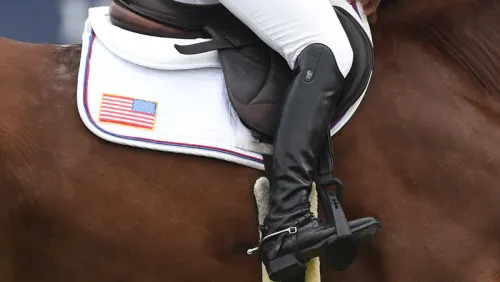In an effort to address some horse care concerns for equitation horses that arose last year, the U.S. Equestrian Federation has instituted a new policy for stabling at the Pennsylvania National Horse Show, where the USEF Medal Finals are held each October.
This year, all equitation horses will have to be at the Farm Show Arena in Harrisburg by noon on Saturday, Oct. 16. There will be designated stabling for the equitation horses, and they will be monitored around the clock for riding, feeding/watering and care.
Bill Moroney, vice chairman for the National Hunter Committee, said they chose a proactive approach. “Action had to be taken. There was so much negative publicity, both in print and verbally, regarding abuses targeted toward equitation horses,” said Moroney. “People need to get a true understanding about what the equitation division is about.”
Moroney hopes that people will realize that the complaints about the mistreatment of equitation horses have been heard and that the USEF is solving the problem.
“Implementing the monitored stabling will help establish a level playing field in two ways,” said Moroney. “First, it will stop the rumors; and, second, if the rumors are true, an end will be put to the unethical actions. The USEF is doing this for the welfare of the horses and the safety of the riders.”
Moroney foresees the monitored stabling being implemented for other equitation finals as well. “This is starting at Harrisburg, as Harrisburg is the easiest place logistically, since it offers the most ‘horse-friendly’ environment,” he said. “It could be done at the Washington [D.C.] International and the Metropolitan National [N.Y.] but it could be a little harder to coordinate due to stabling complexities.”
This monitoring system is similar to that used for grand prix horses during Federation Equestre Internationale-sanctioned events. But, as Mary Chapot, chairman of the USEF Hunter Seat Equitation Committee, explained, the mandatory arrival time for the horses is slightly less than 24 hours. No time limit will be set on how long the horses can be out schooling or longeing.
There are also no restrictions on who can ride or prepare the horses for the finals during the monitoring period.
The show’s managers will absorb the cost of hiring the personnel needed to monitor the stable area. They’ll oversee the barns, schooling area and warm-up ring. They’ll also monitor the horses in their stalls, note how long they’re ridden, how many times they leave their stalls, and at what times.
“Entry fees for the Medal Finals have been raised from $175 to $200 to pay for monitoring,” said Chapot.
If an exhibitor’s horse is injured or falls ill the day of competition, substitutes will be allowed.
Said Moroney, “We’re taking a good first step forward. We’re going to work on this in degrees.”














